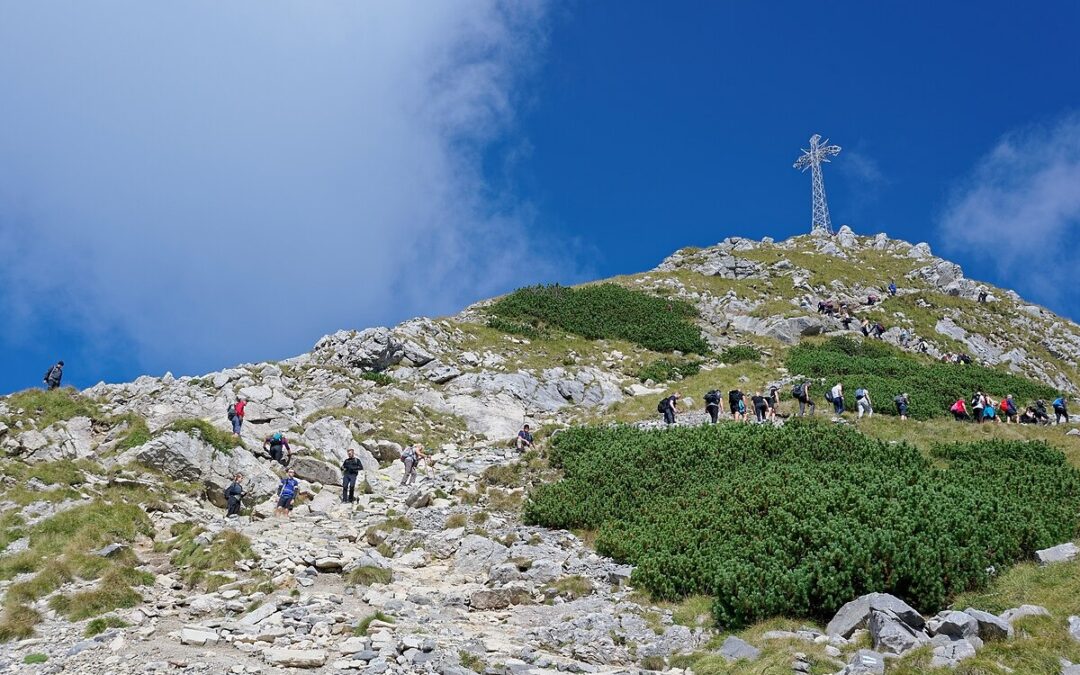Keep our news free from ads and paywalls by making a donation to support our work!

Notes from Poland is run by a small editorial team and is published by an independent, non-profit foundation that is funded through donations from our readers. We cannot do what we do without your support.
The Tatra National Park (TPN) in southern Poland has fined two men who entered the park at night to illuminate the cross on Giewont mountain in commemoration of the 20th anniversary of the death of Polish Pope John Paul II.
They were fined for hiking trails after dark, which is against park regulations. However, the park authorities’ decision has been met with some criticism online, with people highlighting that illuminating the cross at night has been a tradition since the former pope died in 2005.
"Dzisiaj dziękowałem Bogu za to, że wasi przodkowie na Giewoncie wznieśli Krzyż. Ten Krzyż patrzy na całą Polskę, od Tatr do Bałtyku. Ten Krzyż mówi całej Polsce: "Sursum corda!" – W górę serca" 💙 Jan Paweł II, Zakopane, 6 czerwca 1997 💙 Zdjęcie z dziś za Tatromaniak pic.twitter.com/aVAOE9ibsF
— Marzena Nykiel 🇵🇱 (@MarzenaNykiel) April 2, 2025
After climbing Giewont mountain on 2 April, the men waited until 9:37 p.m. – the precise time of John Paul II’s death 20 years ago – to shine battery lamps on the 17.5-metre-tall cross. They were subsequently fined 500 zloty (€116) each by the park authorities.
Entering the TPN trails at night is forbidden from 1 March until 30 November in order to not disrupt the local fauna and to ensure the safety of park visitors.
But the park was quickly criticised by people noting that illuminating the Giewont cross has been an annual tradition since the death of the Polish pope in 2005. Some social media users deemed the move a “disgrace” and declared “shame on TPN”, while others offered to help pay the fines, reported news website Money.pl.
Two more weeks to save @notesfrompoland!
We're halfway through our campaign and we've received 300 donations from our readers. Thank you for the generous support!
But to continue our work we still need your help. Click below to learn more https://t.co/0gVkMlaA0W
— Notes from Poland 🇵🇱 (@notesfrompoland) April 15, 2025
But the national park defended its decision. “Other people who were heading to the top of Giewont before nightfall were told to come back down,” Andrzej Krzeptowski, head of the TPN guard, told the Polish Press Agency (PAP). “Many of them did indeed turn back, but these two people ignored the ban and were punished.”
“We understand the symbolism and the intentions of those who took this action, but that cannot be an excuse for breaking the rules,” park director Szymon Ziobrowski told PAP.
“We do not plan to change the rules in response to media pressure or emotional comments,” he said, highlighting that the regulations are designed to protect nature and ensure the safety of people in the mountains.
“On the contrary, we plan to increase night-time surveillance, especially during periods when there have been violations of the regulations in the past,” he added.
Park officials have closed trails in Poland's southern mountains after a bear cub was sighted several times around a popular skiing route.
With only around 110 brown bears in Poland, they hope the cub will be reunited with its mother https://t.co/0l1LUuRkDe
— Notes from Poland 🇵🇱 (@notesfrompoland) April 25, 2022
Ziobrowski explained that the national park did not receive any formal requests or petitions to organise any commemoration on Giewont mountain on the anniversary of the former pope’s death.
He added that the TPN remains open to discussing ways to commemorate important anniversaries but that compliance with current laws and respect for nature remains a priority. “We believe that forms of commemoration that are both dignified and legal are possible.”
“We are aware of the emotion that surrounds the issue, but it is our duty to be consistent with the principles that protect the Tatra mountains – a place beloved also by John Paul II,” he said.
The steel cross atop Giewont was erected in 1901 and has since become a popular site for religious pilgrimages.
After lightning yesterday killed four hikers, some are blaming the famous steel cross on top of Great Giewont mountain and calling for it to be removed. The head of the mountain rescue service confirms that it 'increases the risk' of lightning strikes https://t.co/rbvMU7ubJQ
— Notes from Poland 🇵🇱 (@notesfrompoland) August 23, 2019
John Paul II was known for his great admiration of the mountains and often frequented the Tatra national park before becoming pope in 1978.
In 1983, during an official visit to Poland, he visited the Tatra mountains, meeting there with Solidarity leader and future president Lech Wałęsa, amid tensions between the Solidarity movement and the communist government.
On a trip to Zakopane – a Polish town located in the Tatras – in 1997, the Polish pope called the Giewont cross “a silent but meaningful witness to our times”.
Pope John Paul II's pilgrimages to his Polish homeland drew enormous crowds and inspired his compatriots in the struggle against communism.
On the centenary of his birth, we present a collection of images from his visitshttps://t.co/AGssO4jnsy
— Notes from Poland 🇵🇱 (@notesfrompoland) May 18, 2020

Notes from Poland is run by a small editorial team and published by an independent, non-profit foundation that is funded through donations from our readers. We cannot do what we do without your support.
Main image credit: Jakub Halun/Wikimedia Commons (under CC BY-SA 4.0)

Agata Pyka is a former assistant editor at Notes from Poland. She specialises in Central and Eastern European affairs, cybersecurity, and investigative reporting. She holds a master’s degree in political communication from the University of Amsterdam, and her work has appeared in Euractiv, the Balkan Investigative Reporting Network (BIRN), and The European Correspondent, among others.



















